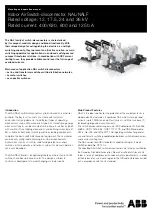
116
ATCA-F140 Series Installation and Use (6806800M67S)
U-Boot
U-Boot
2.
Depending on your system configuration, you may want to specify network
parameters as follows:
setenv ipaddr <IP address>
setenv serverip <IP address>
setenv netmask <netmask>
setenv gatewayip <IP address>
3.
Enter
saveenv
, and then enter
boot
.
5.4
Selecting the Boot Flashes
This configuration determines which flash the blade is to boot from on the next restart. You
can either boot through IPMI or through a U-Boot command.
Using IPMI - This option uses the System Boot Options feature. For more
information, see the ATCA-F140: Control using IPMI Programmer’s Reference.
Using U-Boot command - Use
bootsel 0|1|switch
, where 0 selects boot flash
0, 1 selects boot flash 1 and switch selects the currently stand-by boot flash.
Generally, there is a fixed link between the U-Boot firmware and the kernel image in the
respective boot flash. This means that when the U-Boot in a particular flash is executed, it
subsequently boots the kernel image in the same flash.
If necessary, you can select the kernel to boot manually using the following commands:
setenv kerneladdr e0000000
(for the kernel in the currently active boot flash)
setenv kerneladdr e2000000
(for the kernel in the currently standby boot flash)
NOTE:
Use these commands with care.
5.5
Using the Persistent Memory Feature
Persistent memory means that the memory RAM is not deleted during a reset. Memory
content can be deleted by performing a power cycle or by temporarily removing the power
and then powering up the blade again. This feature is enabled by default on the
ATCA-F140.
Each of the two U-Boot firmware images in the two flashes holds a separate set of
U-Boot environmental variables/boot parameters. Therefore, after switching to
another boot flash, you may need to reconfigure the boot parameters/environmental
variables of the new U-Boot image according to your needs.
















































